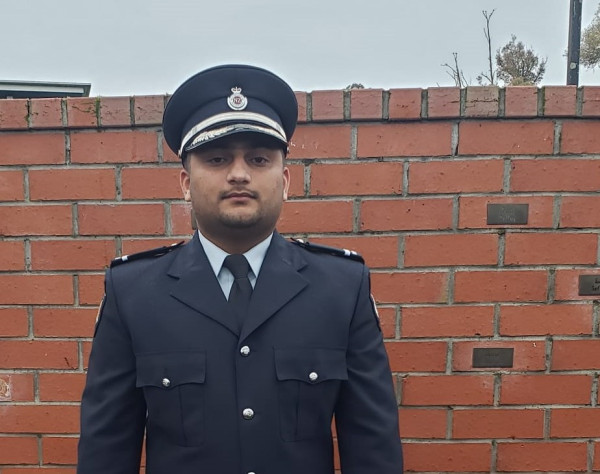29 November 2023
Finding ways to give back - Adeel's story

When Adeel first moved to New Zealand as a refugee in 2018, he was searching for a way to give back to the community.
“In arriving in New Zealand, we received a lot of support from the New Zealand government and the community.
I was really thankful for the opportunity that I got, and wanted to give back to the community, to the society that I was living in.”
Adeel left his home country of Pakistan when he was 15, seeking asylum in Thailand. He lived in Thailand for five years, before moving to New Zealand.
“When we first arrived, I spent about 3 months in a refugee centre, learning about the culture in New Zealand, how the country runs and things. After that, we moved to Hamilton. I spent the first year in New Zealand learning English, then I got my first job working in a process factory.
But there wasn’t much career progression, so I started to want a career change.
I initially applied for a role in the army because I wanted to give back to New Zealand. But I needed to have been living in New Zealand (or Australia or some other countries) for at least five years.”
At the time, Adeel didn’t know anything about Corrections in New Zealand. After seeing an ad for Corrections on Facebook and doing a bit of research looking at the Corrections YouTube channel, he thought this could be his opportunity to give back.
“I thought if I can make a difference for even a single person in the community, that would be a really big thing for me. So, without hesitation, I applied.”
He’s now been working for Corrections for a year and nine months, based at Waikeria Prison.
Working as a Corrections Officer
Coming from a position of knowing nothing about Corrections, Adeel soon learned that the role is a lot bigger than people may realise.
He says that people often draw parallels between Corrections and the Police, but there are important differences.
“With the Police, they might be dealing with an individual for a few hours, if they get a call and there is an incident. But here at Corrections, we are with the same prisoners every single day.
Prisoners are there to serve their sentence - that’s their punishment and that’s the reality. But I believe Corrections Officers play a really big role in terms of the rehabilitation of prisoners.
Part of our role is to understand where they are at the stage of their rehabilitation and work with them accordingly.
Adeel says that every Corrections Officer works with a specific group of prisoners to support their rehabilitation (called their “caseload”), alongside Case Managers.
“Prisoners can request a meeting with a Case Manager, but they might not be available straight away. So that's where we come in, to guide them through the process and to be a mediator between a Case Manager and a prisoner. So, if they need help regarding their sentence or their offender plan, we can talk to the case managers.
Other Corrections Officers are also there to support us - if a prisoner is asking me about something I have no knowledge about, I can always go to a Senior Corrections Officer, Principal Corrections Officer - or even a fellow Corrections Officer. I can go to them and discuss my caseload, or they can discuss their caseload with me.”
Supporting people’s rehabilitation is what Adeel enjoys the most about the role, but he says it can also be the most challenging aspect.
“Sometimes people do lose their motivation and get frustrated about certain things, then they must deal with the consequences, reignite that desire for positive change, and build themselves back up . That can be hard to see, but it’s part of the job. We do our best, but we can’t win all the time.”
Challenging misconceptions
Adeel says that when he tells people he works for Corrections, there are a few different responses he gets.
“Some people are a bit like I used to be, not really knowing anything about Corrections, and are just curious. Other people think it’s like the movies.”
He wants to raise awareness about what the job is really like.
“For new people considering joining I would like them to realise that that there is real satisfaction in the job we do.
Our workforce is very diverse, with people from many different backgrounds and cultures. In addition to our Māori and Pasifika staff, we have people from South Africa, from India, from South America. You will meet people from Europe, England, Germany, you will meet people from Pakistan like me.
So don't be shy if you think this job is for you.”
Ready to make a move?
Start your journey - check out the a list of our current opportunities then apply online today!